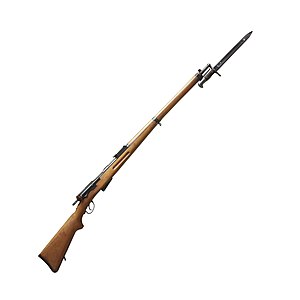Llewyth-Renner Rifle
| Llewyth-Renner rifles | |
|---|---|
 Llewyth-Renner Type 04 Infantry Rifle | |
| Type | Bolt-action rifle |
| Place of origin | Fiannria (contested) |
| Service history | |
| In service | 1890–1958 |
| Used by | |
| Wars | |
| Production history | |
| Designer | Mark Renner and Cory Llewyth |
| Manufacturer | |
| Produced | 1890–present |
| Specifications | |
| Mass | 1886: 4.41 kg (9.7 lb) 1904: 3.92 kg (8.6 lb) 1904/C: 3.2 kg (7.1 lb) 1930: 3.78 kg (8.3 lb) |
| Length | 1886: 1,302 mm (51.3 in) 1904, 1930: 1,300 mm (51 in) 1904/C: 1,015 mm (40.0 in) |
| Barrel length | 1886, 1904, 1930: 780 mm (31 in) 1904/C: 532 mm (20.9 in) |
| Cartridge | 1886: 7.5x53.5 mm 1904, 1904/C, 1930: .30x2" |
| Action | Straight-pull bolt action |
| Muzzle velocity | 620 m/s (2,000 ft/s) |
| Feed system | 1886, 1904, 1904/C:Clip-fed box magazine (6 or 12 rounds) 1930: 6 or 12-round detachable box magazine |
The Llewyth-Renner Rifle was a series of infantry small arms (three infantry rifles, one carbine) first designed by Mark Renner and Cory Llewyth, both prominent arms industrialists, in Fiannria in 1886. The series saw limited success at home, but became the primary infantry armament of Faneria, Yonderre, and Eldmora-Regulus, for various timeframes in the early 20th century.
Design and Sale Issues
The LR rifles were originally fed by six-round stripper clips, but the option to replace the 6-round box with a 12-round variant was available through a fairly quick process when deployed. The 1930 model switched to a readily-detachable magazine, though this meant that older rifles could not readily use new ammunition readily. The 1930 was able to be fed with a stripper clip alternatively, though doing so was considerably more difficult than in the other models and tended to catch when performed (?). When using the magazine as intended, the 1930 had the added option of packing an additional round into the chamber prior to inserting the magazine.
Service History
In spite of their previous contracts with states within the Holy Levantine Empire, Renner and Llewyth, who had partnered in 1883 to improve their chances competing with growing state armaments industries, found little success pitching the LR Rifle to Fiannria, its intended market. Having proven the rifle but losing on the final stretch to bidding due to Renner's crippling gambling debts, the pair turned to Llewyth's native country of Faneria.
In Royalist Service
The shocking turnabout of the Fourth Kin War had put the Fhainnin Royal Army into a panic, and they readily agreed to pay most of the high initial price for a new rifle model as well as extending an offer of asylum. The rifle was adopted fully by the Royal Army as the Type 90 Infantry Rifle, which saw limited deployment during the Boreal War, leading to the introduction of the modified Type 04. Renner died of alcohol-related complications in 1905, while Llewyth founded the Llewyth Rifle Company days before the beginning of the Fhainnin Civil War, during which he kept a low profile until his abduction by the Republicans sometime in 1906. Llewyth's rifles were used widely on both sides in the war.
Second Great War
Ceremonial and Civilian Role
The LR 1904 and 1930 remain in use as sporting rifles to the present, and the LR 1904 is the ceremonial weapon of the Fhainnin government's Assembly Guard and select units tasked with guarding military monuments.
Users
 Faneria: Primary infantry rifle 1904-1941, used in reserve role until 1975. Remains in service in ceremonial roles and as a moderately popular civilian hunting rifle.
Faneria: Primary infantry rifle 1904-1941, used in reserve role until 1975. Remains in service in ceremonial roles and as a moderately popular civilian hunting rifle. Eldmora-Regulus: Used as a training rifle 1914-1950.
Eldmora-Regulus: Used as a training rifle 1914-1950. Yonderre: Used as a reserve rifle 1918-1954.
Yonderre: Used as a reserve rifle 1918-1954.